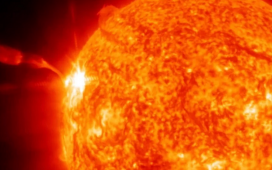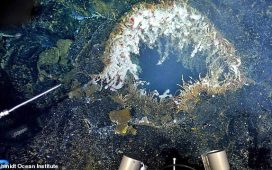
A new water reservoir may have been discovered on the moon, researchers say.
Lunar surface water is of interest to scientists because of its potential to be used as a resource in future moon and space missions.
The study found that glass beads formed from the cooling of melted material ejected by asteroid impacts and found strewn across the moon could store substantial quantities of water.
The findings, based on samples from China’s Chang’e-5 (CE5) mission, suggest lunar regoliths contain a higher amount of solar wind-derived water than previously thought.
These findings indicate that the impact glasses on the surface of the moon and other airless bodies in the solar system are capable of storing solar wind-derived water and releasing it into space
Professor Sen Hu, Chinese Academy of Sciences
Analysis by a group led by Professor Sen Hu from the Institute of Geology and Geophysics (IGG) of the Chinese Academy of Sciences (CAS) found that these glass beads are likely to be a new water reservoir on the moon.
The researchers identified water stored within the impact glass that is consistent with a solar wind origin.
Furthermore, the distribution of water within individual beads indicates water can rapidly accumulate in glass beads, over timescales of only a few years, and be rapidly released.
The authors suggest this presents an efficient recharge mechanism to drive an active water cycle on the surface of the moon.
Prof Hu said: “These findings indicate that the impact glasses on the surface of the moon and other airless bodies in the solar system are capable of storing solar wind-derived water and releasing it into space.”
Many lunar missions have confirmed the presence of structural water or water ice on the moon.
However, past studies have been unable to explain the retention, release, and replenishment of water on the lunar surface.
According to the scientists, water trapped in impact glass beads could represent a potential water resource for future lunar exploration that is relatively easy to extract.
The study, published in Nature Geoscience, was a collaboration with Nanjing University, the Open University, the Natural History Museum, the University of Manchester, and the University of Science and Technology of China.











